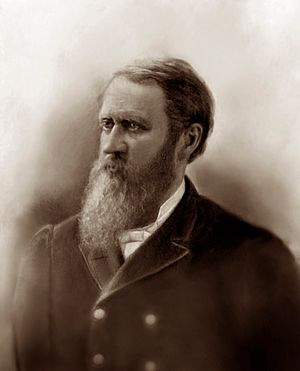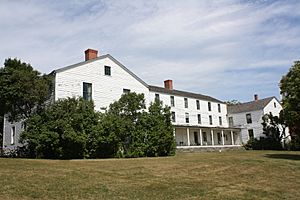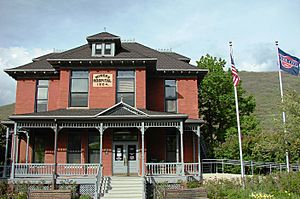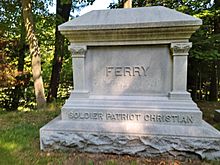William Montague Ferry Jr. facts for kids
Quick facts for kids
Lieutenant Colonel
William Montague Ferry
|
|
|---|---|
 |
|
| Born | July 8, 1824 Mackinac Island, MI |
| Died | January 2, 1905 Park City, UT |
| Buried | |
| Service/ |
U.S. Army |
| Rank | Lieutenant colonel |
William Montague Ferry Jr. (born July 8, 1824 – died January 2, 1905) was an important person in Michigan and Utah. He was an officer in the Union Army during the American Civil War, and he belonged to the well-known Ferry family.
Contents
Early Life and Family Roots
William Montague Ferry Jr. was born in the Mission House on Mackinac Island, Michigan. He was the first son of Reverend William Montague Ferry and Amanda White Ferry. In the 1830s, his family helped start the town of Ferrysburg, Michigan. In 1834, they moved to Grand Haven, Michigan, which they also helped found.
Serving in the Civil War
In August 1861, William Ferry joined the Fourteenth Michigan Infantry. This was a group of soldiers who fought for the Union Army during the American Civil War. He rose through the ranks, becoming a major and then a lieutenant colonel by 1865.
During the war, he worked with General Sherman, a famous military leader. General Sherman once said about Ferry, "You have left your mark in the army, and it will stand to your honor so long as the United States has an army." William's younger brother, Noah Henry Ferry, was also a Major in the Civil War. Sadly, Noah died at the Battle of Gettysburg.
Political Life in Michigan
William Ferry was a leader in Spring Lake several times. He served as Supervisor in 1849, from 1854 to 1859, and again from 1860 to 1861. In 1857, he was elected to the Michigan Legislature, which is the state's law-making group.
In 1871, William's brother, Thomas W. Ferry, became a United States senator for Michigan. This meant Thomas left his job in the House of Representatives. William then ran for that open seat as a candidate for the Democratic Party. However, he lost the election to Wilder D. Foster.
In 1872, Ferry ran for governor of Michigan. He didn't win, getting only a small percentage of the votes. The next year, the winning governor, John J. Bagley, asked Ferry to join a committee. This committee was tasked with updating the constitution of Michigan, which is the state's main set of laws.
Ferry also served as a Regent for the University of Michigan from 1858 to 1863. Later, in 1876, he was elected mayor of Grand Haven.
Political Life in Utah
In 1878, William Ferry moved to Park City, Utah. There, he became involved in the mining industry. From 1884 to 1892, he was a member of the Democratic National Committee, a group that helps lead the Democratic Party across the country. In 1893, he was a Commissioner for the Chicago World's Fair, a huge event that showed off new inventions and cultures.
In 1904, Ferry joined a new political group in Utah called the American Party. He ran for governor of Utah that year. He didn't win, but he received a good number of votes.
Successful Business Ventures
Colonel Ferry was a very successful businessman. He started by working in his father's lumber businesses. Then, he expanded into the iron industry, owning a company called Ottawa Iron Works. His company also owned many lake freighters, which were ships used to carry lumber and iron. He even held several patents (special rights) for inventions related to iron, which made him very successful.
When the lumber business in Michigan slowed down in the 1870s, Colonel Ferry moved to Utah. There, he became one of the biggest mining leaders in the United States. He first owned mines like the Mayflower Mine, the Walker Mine, and the Webster Mine. After a few years, Colonel Ferry and his brother Edward Payson Ferry owned parts of almost all the silver mines in Park City. They also owned silver mines in Nevada, Arizona, and even in Peru.
Colonel Ferry's large Victorian home in Park City is known as the Ferry-Kearns mansion. It is still in Park City today, though it has been moved from its first location.
Many wealthy mining owners were not known for helping others. However, Colonel Ferry was famous for both his mining success and his generous giving. He was one of the main donors to Park City's first hospital, known as Miner's Hospital. He was also the main speaker at its opening.
Ferry also gave land for the campus of Westminster College. He even paid for the school's largest building, Ferry Hall, which was taken down in 1987. Stones from Ferry Hall were later used to build the current Ferry Plaza.
Later Years and Passing
In his old age, Colonel Ferry was almost blind and had severe asthma. He passed away in Park City on January 2, 1905. His funeral was remembered as the most attended event in Park City's history. After the funeral, his body was sent to his hometown of Grand Haven, Michigan. He is buried there in the Ferry Family plot.
Family Life
William Ferry married Jeanette Hollister on October 29, 1851. They had six children together. One of his nephews, W. Mont Ferry, later became the mayor of Salt Lake City from 1916 to 1919.
 | Sharif Bey |
 | Hale Woodruff |
 | Richmond Barthé |
 | Purvis Young |




